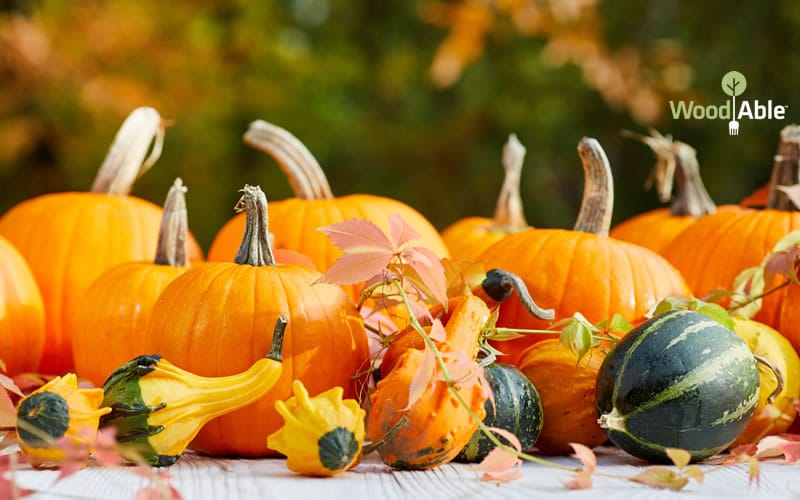WoodAble Blog
Repurposing your Holiday ‘Horn of Plenty’
This is the time of year when the holiday home and table are festooned with pumpkins, squash and the abundance of fall harvest time. Pumpkins, as well as a variety of squashes, are especially perfect foods: wholly useful, and completely compostable. After the holidays, instead of being put into the trash, they can continue to provide so much more than decoration.
Cooking
If you have a whole pumpkin, cut it in half. Scoop out the seeds and stringy parts, and then separate the seeds out. Put the pumpkin halves face down on a baking tray, add a cup of water to the tray and bake them for about 90 minutes. Scoop out the pulp and puree it in a blender. You can add pumpkin puree to just about any meal, including your dog’s meals. It’s high in vitamins and minerals. Baking works well for butternut squash and spaghetti squash, too.
Put strips of pumpkin rind into a dehydrator with sea salt and paprika to make pumpkin crisps that are full of vitamins. They will resemble sweet potato fries.
Pumpkin seeds are also rich in vitamins and minerals. Drizzle a little olive oil and salt, and roast them in the oven for a snack.
Wildlife
Cut pumpkins or squash in half to make a natural bowl, and place bird seed and pumpkin seeds in it, on a table for the birds and squirrels. They will enjoy the seeds and the pulp.
Or cut pumpkins and squash into small sections to spread throughout the yard as a tasty treat for opossum, foxes, chipmunks, rabbits, deer and badgers. If you live near bears, though, maybe not.
Local zoos, wildlife habitats or animal sanctuaries often eagerly welcome pumpkin and squash donations to help feed their animals. Check with places near you.
Back to Nature
Save some raw seeds to plant next season. Rinse them off and let them air dry completely on a paper towel for about four weeks, and then store them in an envelope until planting time in June.
Whatever remains of your pumpkins and squash, as well as hard decorative gourds, can be composted in the backyard. Cut them into small chunks and mix the chunks into turned-up soil so they will degrade faster. If you do this directly into your backyard instead of using a compost bin, and you don’t remove the seeds, you could end up with some volunteer plants in the future, so look for them. An alternative is to remove the seeds and put them out for the wildlife to eat.
You’re left with zero waste and blessings of the Thanksgiving harvest for everyone.

